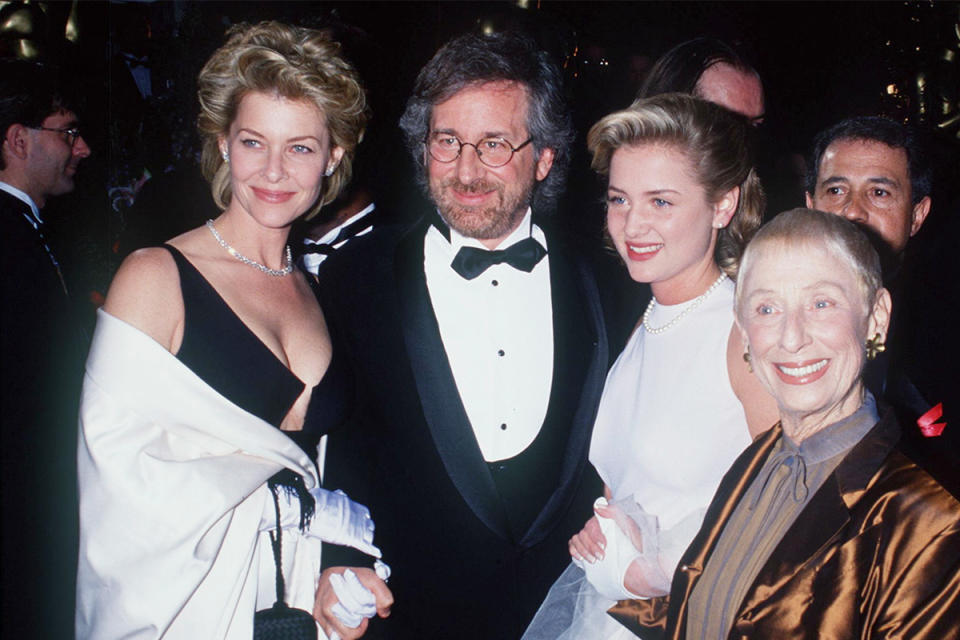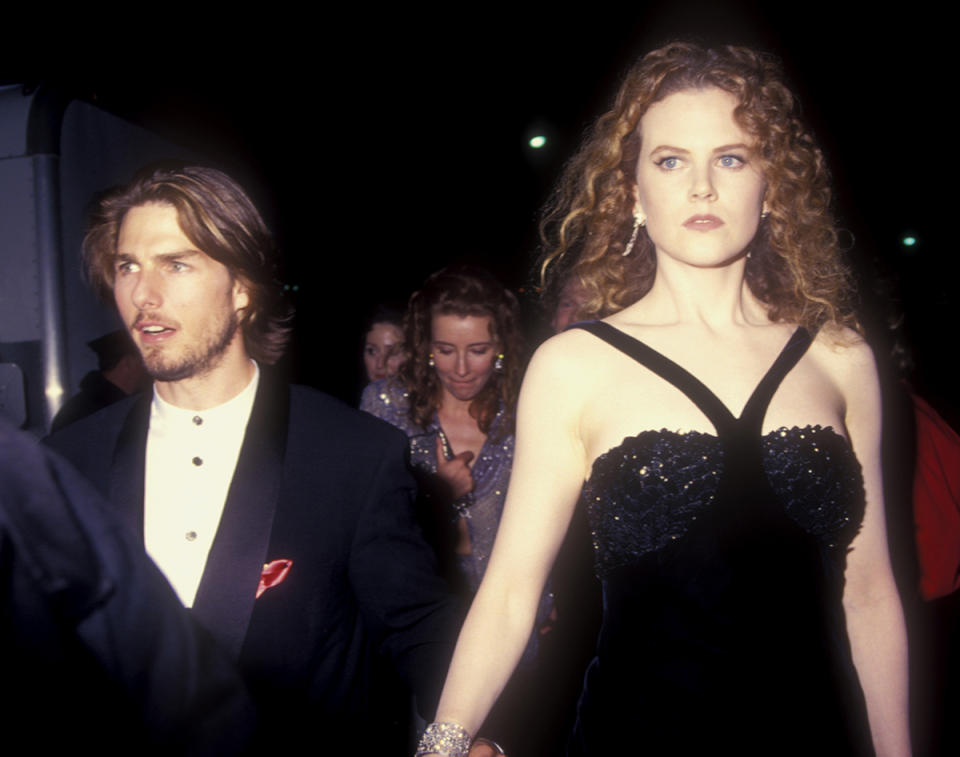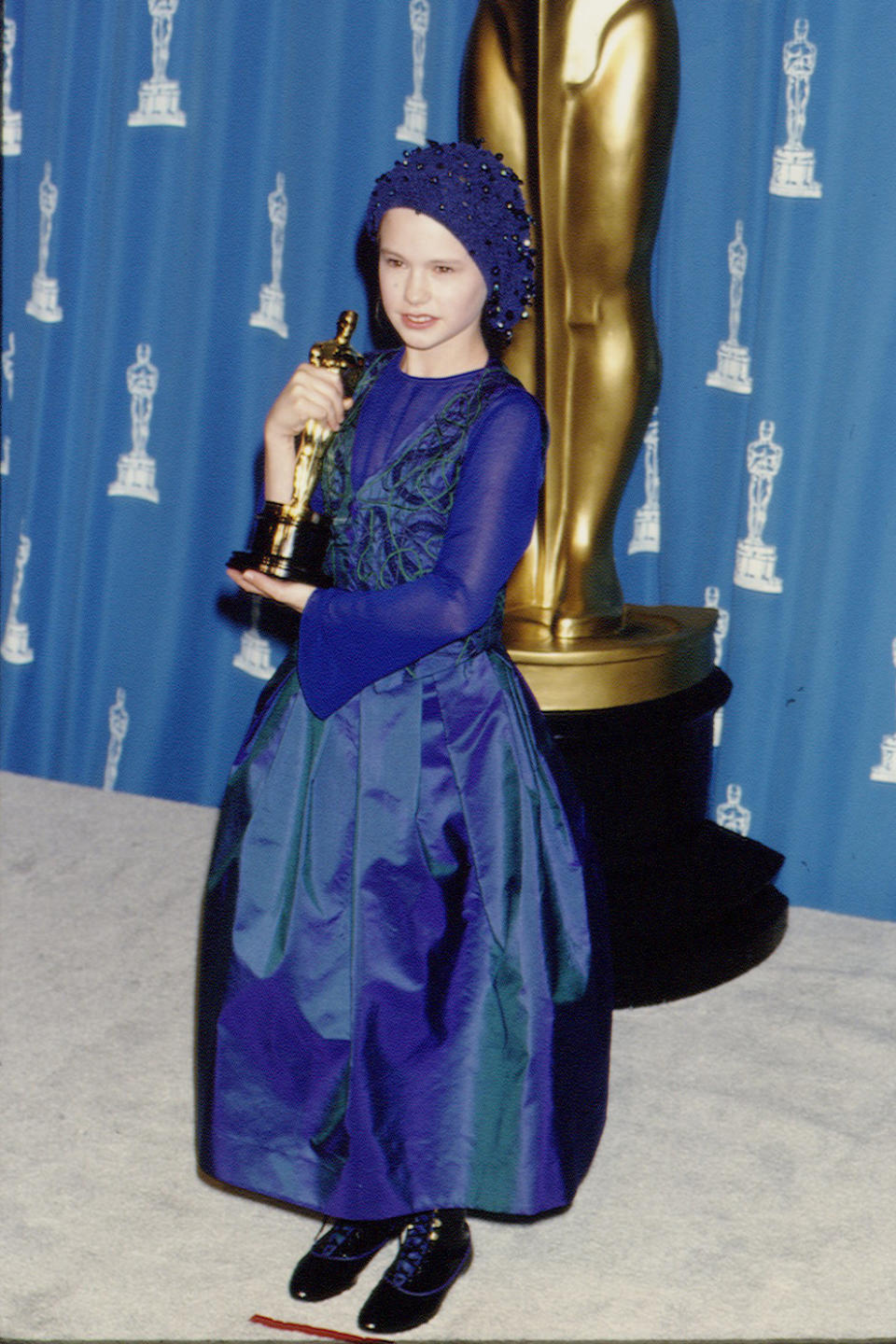How Steven Spielberg Dominated Culture and the 1994 Oscars With ‘Jurassic Park’ and ‘Schindler’s List’

Steven Spielberg kissed his wife and embraced his mother before his left hand floated to his temple in disbelief. Then he grew visibly emotional as he made his way to the stage of the Dorothy Chandler Pavilion. The 46-year-old Spielberg had just won his first Oscar — as best director for “Schindler’s List,” an unflinching look at the Holocaust and its horrors. “This is a big surprise,” presenter Clint Eastwood said somewhat sarcastically.
As Eastwood’s joke suggests, Spielberg’s victory at the 1994 Academy Awards was preordained — an unavoidable coronation after he had dominated popular culture so completely over the past year. Not only had he subverted his image as a boy genius, spinning escapist fantasies out of celluloid, by tackling a project as grown up as “Schindler’s List,” but he had also reestablished himself as the most successful director in Hollywood with another 1993 release, “Jurassic Park.” The adventure film, essentially “Jaws” with dinosaurs, topped box office records to become the highest-grossing movie ever, until “Titanic” surpassed it. Between “Schindler’s List” and “Jurassic Park,” Spielberg films would win 10 Oscars during the ceremony, an extraordinary feat that has rarely been replicated and one that bears reexamination on the 30th anniversary of that accomplishment.
More from Variety
“This is the first time I’ve ever had one of these in my hands,” Spielberg said as he clasped his Oscar, surprised by both the weight of the statuette and the moment. When “Schindler’s List” was named best picture and Spielberg stood behind the podium for a second time that night, he acknowledged his long road to awards glory, one that had seen Oscar voters largely overlook masterpieces like “E.T. the Extra-Terrestrial” and “Close Encounters of the Third Kind.” Winning, he told the crowd, was like “the best drink of water after the longest drought of my life.”
During his meteoric rise in the movie business, Spielberg was admired, envied and dismissed in equal measure. His complicated relationship to the industry became more apparent in the years leading up to the dual triumphs of “Jurassic Park” and “Schindler’s List.” At that time, Spielberg’s magic touch, his innate sense of what an audience desired and how to deliver it, had faltered. “Hook,” a budget-busting fable that reimagined Peter Pan as a jaded adult, made money when it was released in 1991, but endured blistering reviews — Roger Ebert panned it as “a lugubrious retread of a once-magical idea.” Other late-’80s Spielberg fare like “Always” and “Empire of the Sun” failed to exert a hold on moviegoers. Only “Indiana Jones and the Last Crusade,” the third installment in his globe-trotting-archaeologist saga, scored commercially, though it hardly seemed fresh.
And many of his contemporaries were privately rooting for Spielberg to fail. He had been too successful, too beloved, and was overdue for his comeuppance. Plus, his guileless public persona didn’t square with his shrewd business sense and competitiveness, something that rubbed studio executives and power brokers the wrong way. “This man is not the same as the soft and cuddly characters he creates,” a top agent told Variety in a 1991 article. In that same piece, an unnamed studio chief knocked Spielberg’s monarchical tendencies: “It’s the rule of kings: ‘I am the king and I make the rules.’”

During the lead-up to the release of “Schindler’s List,” Spielberg bristled when asked by The New York Times about the resentment that he inspired in colleagues. “I don’t feel the jealousy, I don’t feel the envy, only when I hear about it. I have a feeling that the people who say these things about me are the ones who see me socially and drink my Evian water with me and call themselves my friends. But that’s Hollywood.”
That two-facedness has been a staple of a business that has run on backstabbing and hollow compliments since the silent era, and it remains a fixture of the industry today. But in other important ways, 1993 represented a transitional moment in moviemaking, politics and society.
Bill Clinton was inaugurated in January 1993, ending 12 years of Republican dominance of the executive branch, while ushering a brand of centrism that married social progressivism with economic boosterism. The president was a film fan too, one who urged all Americans to see “Schindler’s List,” an unprecedented White House endorsement of a movie.
There was also a growing tabloid-ification of politics and media. This was an era when coverage of the new administration collided with headlines about Tonya Harding, Joey Buttafuoco and the Menendez brothers, a convergence that Oscar host Whoopi Goldberg alluded to in her opening monologue, joking that she wanted Lorena Bobbitt, notorious for separating her abusive husband from his penis, to “please meet Bob Dole.”
And in April of 1993, the source code for the World Wide Web was released into the public domain, allowing people to more easily access the internet. This new digital age would loosen the cultural grip that Hollywood held on consumers, setting the stage for YouTube, TikTok, streaming and other forms of entertainment that would challenge the movie business’s preeminence.
At the same time, the CGI that enabled velociraptors and T. rexes to convincingly share the screen with human actors in “Jurassic Park” was a technological breakthrough that fundamentally altered blockbuster entertainment. It allowed filmmakers to conjure up mythical worlds, spectacular explosions and superheroes who defied the laws of gravity. Without these pixelated wonders, there would be no “Titanic,” no “Gladiator,” no “Forrest Gump,” nor any of the other special effects-heavy movies that came to define the ensuing decade of moviegoing.

But that lay in the future. In 1993, there were more immediate concerns. Al Pacino, Leonardo DiCaprio and other A-listers in the audience at the Oscar ceremony sported red ribbons, a symbol of the AIDS crisis, which snuffed out a generation of entertainers as it became the leading cause of death for Americans between 25 and 44 years old. The epidemic was the subject of “Philadelphia,” the first major studio movie to tackle AIDS, and an unlikely box office hit that scored its star Tom Hanks his first Oscar that night. “The streets of heaven are too crowded with angels,” Hanks said, choking up as he accepted his prize. “We know their names. They number 1,000 for each one of the red ribbons that we wear.”
The other big winner was Jane Campion’s “The Piano,” a drama about a mute woman’s dangerous bond with her musical instrument, which captured best original screenplay, as well as best supporting actress and best actress for 11-year-old Anna Paquin and Holly Hunter. Tommy Lee Jones rounded out the major acting categories, winning supporting actor for his role as a driven marshal in “The Fugitive.”
“The Piano” kicked off the awards dominance of Miramax, the studio that released the movie, and its volatile co-founders Harvey and Bob Weinstein. Before Harvey Weinstein became synonymous with the #MeToo era for his legacy of sexual abuse and assault, he created a business model around critically acclaimed art-house fare aimed at discerning moviegoers, which made it possible for films like “Pulp Fiction,” “The Crying Game” and “Shakespeare in Love” to reach a wider audience. Awards were always a critical element of this strategy, raising the profile of idiosyncratic movies. That resulted in more aggressive Oscar campaigning, with armies of bare-knuckled Miramax awards strategists boosting their own movies by privately slamming rival films as culturally insensitive or historically inaccurate. For a while, it worked. As Harvey Weinstein’s sway over the Oscars grew, winners thanked him in their acceptance speeches more often than they thanked God.

But on that March night, it was all about Steven Spielberg. “Schindler’s List,” with its refusal to sanitize Nazi barbarity, signaled a new maturity in his filmmaking and a shift in his artistic interests. He retained his flair for crowd-pleasers, directing a sequel to “Jurassic Park” and hits like “War of the Worlds,” but he grew more interested in historical epics like “Lincoln” and “Saving Private Ryan,” which used his cinematic gifts to bring the distant past to vibrant life.
As he accepted the best picture statuette for “Schindler’s List,” Spielberg spoke directly to the telecast’s 46 million viewers. “Do not allow the Holocaust to remain a footnote in history,” he said. “Please teach this in your schools. … Listen to the words and the echoes and the ghosts.”
Spielberg was joined onstage by a living reminder of those atrocities. His fellow producer and winner, Branko Lustig, had been imprisoned as a child for two years in Auschwitz and Bergen-Belsen. “My number was 83317,” Lustig said. And then, “People died in front of me in the camps. Their last words were ‘Be a witness of my murder. Tell the world how I died.’ … By helping Steven to make this movie, I hope I fulfill my obligation to the innocent victims of the Holocaust.”
Best of Variety
Sign up for Variety’s Newsletter. For the latest news, follow us on Facebook, Twitter, and Instagram.


